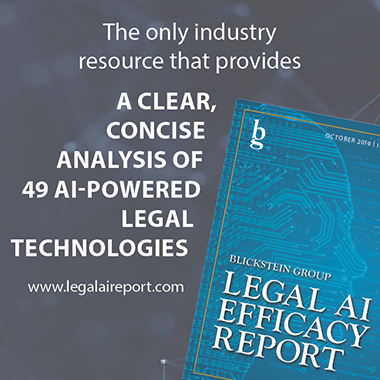Trellis Legal Intelligence
Posted on September 8, 2020 by Joseph Lamport
A look under the hood at the engine transforming state trial court legal research and analytics
If you want to understand how advanced technology is driving transformational change in the legal market, instead of looking at how law firms and lawyers operate today, it is far more instructive to consider the legal tech companies that are building next generation tools and products based on AI and machine learning. These companies are themselves the first and best proponents for a new way of doing business, illustrative of the incredible things that can be accomplished with state-of-the-art technology. They are building their own businesses from the bottom up, leveraging AI and machine learning to the max. This is what enables them to run lean and also run circles around their larger entrenched competitors, such as Thomson Reuters and Lexis-Nexis. This is what enables them to routinely bring innovative products to market.
Trellis Research Inc. is a perfect example. Founded as a bootstrap start-up in 2018, the company has single-handedly pioneered the idea of collecting and mining state trial court data to provide valuable insights for litigators and legal teams. In less than 3 years, Trellis developed the technology, collected a trove of data, launched a first-generation product in California, and then rolled out their service in rapid succession in New York, Texas, Florida, Delaware and Illinois. Not too shabby for a start-up that only recently increased their headcount from 6 to 15.
 Of course, as with many start-ups, Trellis also has a more complicated and interesting back story. The idea for the business initially sprang from the brain of Nicole Clark, while she was a litigator at a California law firm, with a practice focused on employment law. From an early stage in her career, Nicole had been struck by the haphazard way in which lawyers prepared motion papers, without ready access to reliable information about the trial court judge who was scheduled to handle the hearing.
Of course, as with many start-ups, Trellis also has a more complicated and interesting back story. The idea for the business initially sprang from the brain of Nicole Clark, while she was a litigator at a California law firm, with a practice focused on employment law. From an early stage in her career, Nicole had been struck by the haphazard way in which lawyers prepared motion papers, without ready access to reliable information about the trial court judge who was scheduled to handle the hearing.
Clark’s aha moment came one night while she was writing a motion for summary judgment. Lacking any information about the judge, she felt hamstrung about how to structure her argument. After complaining to a colleague working down the hall, it turned out that the colleague had appeared before the same judge and had a copy of the judge’s prior ruling on the exact same question at issue in the pending motion. “And that was when the light bulb went off for me,” according to Clark. “I realized how crazy it was that lawyers didn't have ready access to that kind of practical information even though the data was out there. How was it possible that here we were primarily litigating in state trial courts, and yet we were using appellate court resources to do all of our legal research? It just didn't make any sense.”
It proved to be a long road from Clark’s late-night inspiration to launching Trellis’ first generation product. There were countless obstacles to overcome, largely due to the difficulty of collecting and processing state trial court data – otherwise Thomson Reuters and Lexis would likely have tackled this challenge long ago. Not only is every state different, in most cases there is also variety from county to county, and even from court to court, in terms of the way the data is stored and presented, which is precisely why no one had yet been able to aggregate and systematically analyze it.
But around the same time that Clark had her aha moment, rapid advances were being made in machine learning and natural language processing, for the first time making it possible to tackle problems involving massive amounts of unstructured data. Clark had the good fortune to have several friends who were engineers with expertise in the emerging field. And as it turns out, machine learning was exactly the right technology for the job.
“There is no way that humans alone could go through the enormous volume of data we needed in order to build Trellis,” Clark explains. “I can’t even begin to imagine what a laborious manual process it would have been to tackle this without a machine learning engine.” But with the help of the proper algorithm, the small dedicated team at Trellis was able to accomplish the task with uncanny efficiency.
“Even now,” as Clark explains, “we’re at the infancy of what machine learning and natural language processing will be able to accomplish. This is part of what makes it so exciting for start-ups in the legal tech space these days. Machine learning is also an engine for continuous improvement, which means Trellis today has only achieved a fraction of our potential.”
Trellis is providing PinHawk members complimentary 14-day access to its AI-powered state trial court legal research and judicial analytics platform. Visit trellis.law/free-trial/activate/PinHawk to try Trellis for free today.
Predicting the Future - With and Without AI
Posted on March 9, 2020 by Joseph Lamport
 When it comes to forecasting the future effects of technology, there is a well-recognized maxim known as Amara’s law, named after the technologist Roy Amara. In his words, “[W]e tend to overestimate the effect of a technology in the short run and underestimate the effect in the long run.” The mind, in other words, quickly leaps to conclusions without regard for the often lugubrious pace of the tech adoption cycle. But taking stock of the rapid of development of the next generation of AI-powered tools that are capable of legal reasoning and outcome prediction, it is becoming increasingly apparent that the business of litigation is poised for a radical transformation through the application of these new technologies.
When it comes to forecasting the future effects of technology, there is a well-recognized maxim known as Amara’s law, named after the technologist Roy Amara. In his words, “[W]e tend to overestimate the effect of a technology in the short run and underestimate the effect in the long run.” The mind, in other words, quickly leaps to conclusions without regard for the often lugubrious pace of the tech adoption cycle. But taking stock of the rapid of development of the next generation of AI-powered tools that are capable of legal reasoning and outcome prediction, it is becoming increasingly apparent that the business of litigation is poised for a radical transformation through the application of these new technologies.
The AI-Assisted Revolution Hits Full Stride
Posted on March 2, 2020 by Joseph Lamport
 AI really does have the potential to change almost everything we know or think we know about the business of litigation. That may be the real significance of the latest announcement from Casetext, one of the companies that is at the forefront of transforming the legal market with AI-assisted technology. This AI-powered revolution may not be televised but it is nonetheless now available on your desktop or even via the screen of your handheld device.
AI really does have the potential to change almost everything we know or think we know about the business of litigation. That may be the real significance of the latest announcement from Casetext, one of the companies that is at the forefront of transforming the legal market with AI-assisted technology. This AI-powered revolution may not be televised but it is nonetheless now available on your desktop or even via the screen of your handheld device.
Solving Problems with AI: Contract Management
Posted on March 2, 2020 by Brad Blickstein
As part of a continuing series on the uses of AI in legal practice, Brad Blickstein looks at how AI tools and technology are transforming contract management, covering applications in both the pre-execution and post-execution stages of deployment.
Rewire Law: An Impressionistic View of the Future of Legal AI
Posted on March 1, 2020 by Ron Friedmann
Despite five years of legal artificial intelligence hubbub, its impact to date has still been fairly limited. Putting AI in the context of many other long-term legal market trends, however, Ron Friedmann (one of the legal market's most insightful commentators) envisions a much bigger impact in the future. In this article, Ron provides us with his impressionistic view of the future legal landscape in which law has been rewired and reengineered thanks to the power of AI and machine learning.
AI in Practice: a glimpse at the road ahead
Posted on January 31, 2020 by PinHawk Editors
What’s happening in the legal market today is part of a much larger story which touches almost every sector of the world’s economy and culture. The advent of artificial intelligence and machine learning is part of what has been called the Fourth Industrial Revolution; it rests upon the convergence and integration of digital, biological and physical systems, which opens the door to incredibly more powerful and streamlined ways to manage information, as well as to produce all conceivable types of goods and services. In other words, it’s a pretty big deal, and well worth paying attention to the way these emerging technologies are spurring the economic, social and cultural transformations of the 21st century.
Solving Problems with Legal AI: Insight and Predictive Tools
Posted on January 29, 2020 by Brad Blickstein
Brad Blickstein has spent the better part of the past year researching and writing the Legal AI Efficacy Report, which is the first-ever independent report covering dozens of the most significant AI-powered legal tech tools on the market. As Brad explains it, when he first approached the subject, he thought of legal AI as one big thing but soon realized that a better way to look at it is as a number (at least 100) of “AI-powered legal tools”, each of which has been optimized to serve a different purpose.
Blickstein identifies eight major categories (or problem sets) that account for the majority of these AI-powered tools on the market today. In the first part of a two part article for PinHawk, Brad has summarized some of the key findings that relate to the category of AI tools for Insight and Prediction, which is rapidly emerging as one of the most promising arenas for the use of AI in the legal market.
Keeping Humans-in-the-Loop
Posted on January 29, 2020 by Joseph Lamport
One of the major obstacles to adoption of AI/ML tools is just how labor intensive these projects can be, at least at the outset, due to the need to undertake adequate system training. AI/ML systems rarely work smoothly out of the box, especially not when it comes to applications in the legal market, which entail processing large amounts of unstructured data. That's why service providers may be key to successful AI/ML project implementation.
Continual Amazement at the Power of Technological Innovation: an interview with Lane Lillquist, the CTO of InCloudCounsel
Posted on January 28, 2020 by PinHawk Editors
Behind every robot and algorithm there stands one or more human creators. So as part of PinHawk's coverage of AI/ML in legal practice, we want to introduce you to some of the people behind the curtain, who are responsible for the products and companies that are driving the remarkable developments we're seeing in the market.
This week we had a chance to interview Lane Lillquist who is the CTO and co-founder of InCloudCounsel, a company at the forefront of transforming the way corporations manage high volume legal contracting using a unique platform that integrates AI-powered tools with outsourced
Recent AI News



